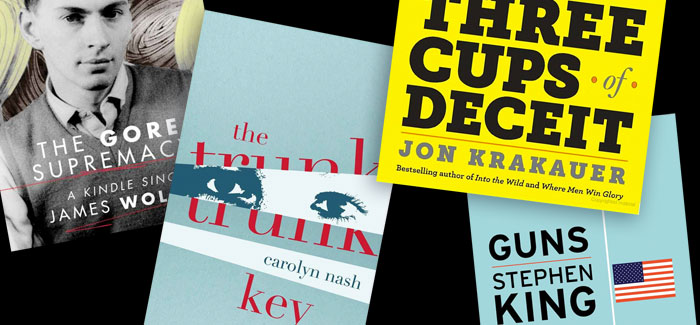
Blum’s leadership of Kindle Singles has helped define digital publishing. (Images courtesy Amazon.com)
David Blum shapes the digital publishing strategy at Amazon.
David Blum, AB’77, wrote his BA thesis on Norman Mailer’s 1968 The Armies of the Night: History as a Novel, the Novel as History, a book that Blum’s job keeps at the front of his mind. “I probably think about that once a week in this job, the idea of great novelists writing great nonfiction.” As editor of Kindle Singles, Amazon’s ambitious digital publishing effort, Blum gives established writers a chance to try new approaches. Kindle Singles are fiction and nonfiction works that, at 5,000 to 30,000 words, fall somewhere between magazine articles and books. Among the hundreds of titles Blum has published are nonfiction works by novelists such as Ann Patchett and Erica Jong, as well as short fiction by Margaret Atwood and Jennifer Weiner. Journalists including the late Christopher Hitchens, James Wolcott, and Buzz Bissinger have written Singles.
The Singles motto is “compelling ideas expressed at their natural length.” Blum didn’t write it, but he has come to see it as a mantra. “It’s wonderful to be able to let writers roam creatively to the proper finishing point of what they’re trying to say,” he says, instead of condensing a story to fit magazine specs, which are less generous now than, say, 40 years ago. By the same token, writers tackling something bigger don’t have to “puff up” the story to fill a book. The best Singles, Dwight Garner wrote in the New York Times last March, “allow real writers a chance to stretch their legs. They’re the literary equivalent of a week’s sailing trip, not a Thor Heyerdahl slog across an ocean, with reader and writer lashed to the mast.”
Each work costs between $0.99 and $4.99. The author sets the price and Amazon pays them 70 percent royalties. “One of the fundamental principles of Kindle Singles is that authors are self-publishing their work through our self-publishing platform,” says Blum—though it is self-publishing with gatekeepers. A staff helps weed through submissions, but he reads and approves every published Single.
Blum, who has spent his entire career as a writer and editor, joined the Singles project two months before its January 2011 launch. His literary tastes guide his decisions—tastes whose development he traces back to the Core curriculum. From studying Aristotle he concluded that “people struggling is the engine of drama,” he says. “The excitement of drama and conflict—that’s what I look for in a Kindle Single.”
Among the most talked-about Singles is Jon Krakauer’s 75-page Three Cups of Deceit (2011), about the misdeeds of globetrotting humanitarian Greg Mortenson. Joshua Davis’s 47-page John McAfee’s Last Stand (2012) documents the weird world of the software pioneer who fled Belize last year amid a murder investigation. There are Singles about the Costa Concordia disaster, the Lance Armstrong case, and the Rolling Stones’ 1969 American tour.
Some manuscripts arrive unsolicited, and sometimes Blum plays matchmaker, approaching a particular writer with a potential subject. He asked Wolcott to write The Gore Supremacy (2012), a 17-page profile of Gore Vidal written shortly after Vidal’s death, and sought out Hitchens for a piece about the killing of Osama bin Laden that turned into the 15-page The Enemy (2011). Sometimes Blum helps writers shape their pieces; other times, drafts arrive “ready to go.” The format allows for nimble publishing; in January, Kindle released Guns, a 25-page essay on gun control that novelist Stephen King had finished writing a week earlier.
Last September, Amazon announced that it had sold 3.5 million Singles. Blum is pleased with the numbers, though Amazon won’t say whether the project is making money. Titles are advertised in Amazon customer newsletters, and “the Kindle Single store functions as a promotion in the same way that walking into a bookstore might,” Blum says. Using the free Kindle app, customers can read Singles on multiple smartphones, computers, and tablets.
Blum’s affinity for narrative storytelling is reflected in the Singles list. A journalist and author before joining Amazon, he edited the Village Voice and the New York Press and has written for the Wall Street Journal, Esquire, New York magazine, and the New York Times Magazine. His books, including Flash in the Pan: The Life and Death of an American Restaurant (Simon & Schuster, 2009), fall in the category of narrative journalism.
Blum’s fiction list is dominated by short stories—Lee Child’s Second Son (2011) is the all-time best-selling Kindle Single—but he’s also published novellas by Joyce Carol Oates, Dean Koontz, and others, helping to revive “one area of fiction that has diminished in recent years … because there were fewer places publishing them.” A few new fiction writers have made a splash. Among Blum’s favorite Singles is a first-person crime story, Cornbread (2012), the debut of recent Johns Hopkins MFA Sean Hammer. His “lyrical and dead-on depiction of a southern woman’s voice and struggle just blew me away,” Blum says. Another is the novella The Trunk Key (2012), a thriller by a previously unpublished writer, Carolyn Nash.
Before Amazon opened the store, Blum wasn’t sure they’d sell any Singles. Now that readers have shown an appetite for them, their appeal seems clear. “Not to slight 1,200-page novels, which I love,” he says, “but there is … fun and satisfaction in reading something in a single sitting.”
